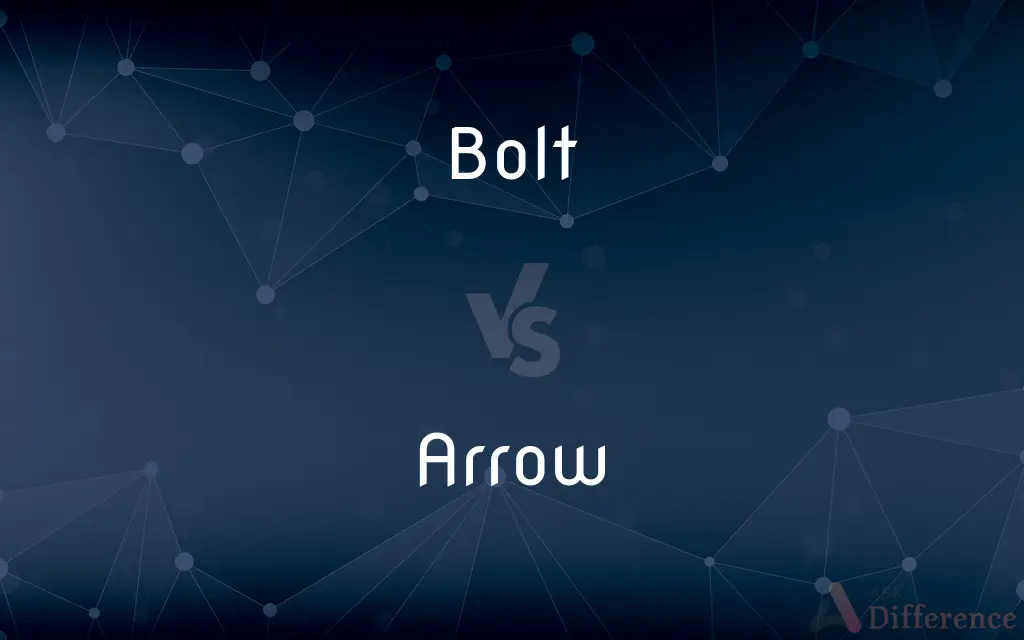Bolt vs. Arrow — What's the Difference?
By Urooj Arif & Fiza Rafique — Updated on April 20, 2024
A bolt is a short, heavy projectile for crossbows, typically without fletching; an arrow is a longer, fletched projectile used with bows.

Difference Between Bolt and Arrow
Table of Contents
ADVERTISEMENT
Key Differences
Bolts are used specifically with crossbows, characterized by their short, stout design which makes them suitable for the mechanical strength of crossbows. Arrows, on the other hand, are designed for use with traditional bows and are generally longer and lighter with fletching to stabilize flight.
Bolts usually lack the stabilizing fletchings found on arrows, relying instead on their mass and the crossbow's accuracy. Whereas arrows have fletchings that help them maintain a steady trajectory and increase their range and accuracy.
The design of a bolt allows it to be effective at penetrating armor and other tough materials, emphasizing power over distance. In contrast, arrows are built for range and precision, often used in hunting and archery sports.
While bolts are typically loaded into a crossbow's firing mechanism, arrows are nocked onto a bowstring and drawn manually, highlighting the differences in how each is used in practice.
Comparison Chart
Length
Shorter and thicker
Longer and thinner
ADVERTISEMENT
Use with
Crossbows
Bows
Fletching
Usually none
Typically has fletchings
Primary Use
Close-range, high impact
Long-range, precision shooting
Material Impact
Heavier, for greater penetration
Lighter, for distance and speed
Compare with Definitions
Bolt
Typically lacks fletchings and has a blunt or pointed tip.
The bolt's pointed tip was ideal for piercing tough materials.
Arrow
Designed for distance and precision.
The arrow's lightweight design allowed it to travel long distances.
Bolt
Used historically in warfare and hunting.
Medieval soldiers used bolts in their crossbows during sieges.
Arrow
Has stabilizing fletchings to maintain trajectory.
The arrow's fletchings helped it maintain a straight path in flight.
Bolt
A heavy, short projectile used with crossbows.
The bolt thudded into the target with a heavy impact.
Arrow
Commonly used in modern sport archery and traditional hunting.
The hunter used a sharp arrow for a clean shot.
Bolt
Designed for powerful, close-range shooting.
The bolt was effective at breaking through the armor.
Arrow
Typically made of wood, fiberglass, or carbon fiber.
The carbon fiber arrow was both light and durable.
Bolt
Often made of metal or dense materials for impact.
The metal bolt was heavier and more durable than an arrow.
Arrow
A long, slender projectile with fletchings for use with a bow.
The arrow flew gracefully across the field, hitting the bullseye.
Bolt
A bar made of wood or metal that slides into a socket and is used to fasten doors and gates.
Arrow
An arrow is a fin-stabilized projectile launched by a bow. A typical arrow usually consists of a long, stiff, straight shaft with a weighty (and usually sharp and pointed) arrowhead attached to the front end, multiple fin-like stabilizers called fletchings mounted near the rear, and a slot at the rear end called nock for engaging the bowstring.
Bolt
A metal bar or rod in the mechanism of a lock that is thrown or withdrawn by turning the key.
Arrow
A weapon consisting of a thin, straight stick with a sharp point, designed to be shot from a bow
I've never used a bow and arrow
The road continues straight as an arrow
Bolt
A fastener consisting of a threaded pin or rod with a head at one end, designed to be inserted through holes in assembled parts and secured by a mated nut that is tightened by applying torque.
Arrow
Move or appear to move swiftly and directly
Lights arrowed down into the airport
Bolt
A sliding metal bar that positions the cartridge in breechloading rifles, closes the breech, and ejects the spent cartridge.
Arrow
A missile having a straight thin shaft and typically having a pointed head at one end and flight-stabilizing vanes at the tail end, meant to be shot from a bow.
Bolt
A similar device in any breech mechanism.
Arrow
Something, such as a directional symbol, that is similar to an arrow in form or function.
Bolt
A short, heavy arrow with a thick head, used especially with a crossbow.
Arrow
To move like an arrow.
Bolt
A flash of lightning; a thunderbolt.
Arrow
To shoot with an arrow
Arrowed a deer.
Bolt
A sudden or unexpected event
The announcement was a veritable bolt.
Arrow
A projectile consisting of a shaft, a point and a tail with stabilizing fins that is shot from a bow.
Bolt
A sudden movement toward or away.
Arrow
A sign or symbol used to indicate a direction (e.g. →).
Bolt
A large roll of cloth of a definite length, especially as it comes from the loom.
Arrow
(graph theory) A directed edge.
Bolt
To secure or lock with or as if with a bolt.
Arrow
A dart.
Bolt
To arrange or roll (lengths of cloth, for example) on or in a bolt.
Arrow
(computing) The -> symbol, which has specific meanings in various programming languages.
Bolt
To eat (food) hurriedly and with little chewing; gulp.
Arrow
(botany) The inflorescence or tassel of a mature sugar cane plant.
Bolt
To desert or withdraw support from (a political party).
Arrow
(intransitive) To move swiftly and directly (like an arrow).
Bolt
To utter impulsively; blurt.
Arrow
(transitive) To let fly swiftly and directly.
Bolt
(Archaic) To shoot or discharge (a missile, such as an arrow).
Arrow
To develop an inflorescence.
Bolt
To move or spring suddenly.
Arrow
To navigate using the arrow keys.
Arrow left until you reach the start of the text you want to delete.
Bolt
To start suddenly and run away
The horse bolted at the sound of the shot. The frightened child bolted from the room.
Arrow
A missile weapon of offense, slender, pointed, and usually feathered and barbed, to be shot from a bow.
Bolt
To break away from an affiliation, as from a political party.
Arrow
A mark to indicate a direction or relation
Bolt
(Botany) To flower or produce seeds prematurely or develop a flowering stem from a rosette.
Arrow
A projectile with a straight thin shaft and an arrowhead on one end and stabilizing vanes on the other; intended to be shot from a bow
Bolt
To pass (flour, for example) through a sieve.
Bolt
A (usually) metal fastener consisting of a cylindrical body that is threaded, with a larger head on one end. It can be inserted into an unthreaded hole up to the head, with a nut then threaded on the other end; a heavy machine screw.
Bolt
A sliding pin or bar in a lock or latch mechanism.
Bolt
A bar of wood or metal dropped in horizontal hooks on a door and adjoining wall or between the two sides of a double door, to prevent the door(s) from being forced open.
Bolt
A sliding mechanism to chamber and unchamber a cartridge in a firearm.
Bolt
A small personal-armour-piercing missile for short-range use, or (in common usage though deprecated by experts) a short arrow, intended to be shot from a crossbow or a catapult.
Bolt
A lightning spark, i.e., a lightning bolt.
Bolt
A sudden event, action or emotion.
The problem's solution struck him like a bolt from the blue.
Bolt
A large roll of fabric or similar material, as a bolt of cloth.
Bolt
(nautical) The standard linear measurement of canvas for use at sea: 39 yards.
Bolt
A sudden spring or start; a sudden leap aside.
The horse made a bolt.
Bolt
A sudden flight, as to escape creditors.
Bolt
A refusal to support a nomination made by the party with which one has been connected; a breaking away from one's party.
Bolt
An iron to fasten the legs of a prisoner; a shackle; a fetter.
Bolt
A burst of speed or efficiency.
Bolt
A stalk or scape (of garlic, onion, etc).
Bolt
A sieve, especially a long fine sieve used in milling for bolting flour and meal; a bolter.
Bolt
To connect or assemble pieces using a bolt.
Bolt the vice to the bench.
Bolt
To secure a door by locking or barring it.
Bolt the door.
Bolt
(intransitive) To flee, to depart, to accelerate suddenly.
Seeing the snake, the horse bolted.
The actor forgot his line and bolted from the stage.
Bolt
(transitive) To cause to start or spring forth; to dislodge (an animal being hunted).
To bolt a rabbit
Bolt
To strike or fall suddenly like a bolt.
Bolt
(intransitive) To escape.
Bolt
To produce flower stalks and flowers or seeds quickly or prematurely; to form a bolt (stalk or scape); to go to seed.
Lettuce and spinach will bolt as the weather warms up.
Bolt
To swallow food without chewing it.
Bolt
To drink one's drink very quickly; to down a drink.
Come on, everyone, bolt your drinks; I want to go to the next pub!
Bolt
To refuse to support a nomination made by a party or caucus with which one has been connected; to break away from a party.
Bolt
To utter precipitately; to blurt or throw out.
Bolt
To sift, especially through a cloth.
Bolt
To sift the bran and germ from wheat flour.
Graham flour is unbolted flour; in contrast, some other flours have been bolted.
Bolt
To separate, assort, refine, or purify by other means.
Bolt
(legal) To discuss or argue privately, and for practice, as cases at law.
Bolt
Suddenly; straight; unbendingly.
The soldiers stood bolt upright for inspection.
Bolt
A shaft or missile intended to be shot from a crossbow or catapult, esp. a short, stout, blunt-headed arrow; a quarrel; an arrow, or that which resembles an arrow; a dart.
Look that the crossbowmen lack not bolts.
A fool's bolt is soon shot.
Bolt
Lightning; a thunderbolt.
Bolt
A strong pin, of iron or other material, used to fasten or hold something in place, often having a head at one end and screw thread cut upon the other end.
Bolt
A sliding catch, or fastening, as for a door or gate; the portion of a lock which is shot or withdrawn by the action of the key.
Bolt
An iron to fasten the legs of a prisoner; a shackle; a fetter.
Away with him to prison!lay bolts enough upon him.
Bolt
A compact package or roll of cloth, as of canvas or silk, often containing about forty yards.
Bolt
A bundle, as of oziers.
Bolt
A sudden spring or start; a sudden spring aside; as, the horse made a bolt.
Bolt
A sudden flight, as to escape creditors.
This gentleman was so hopelessly involved that he contemplated a bolt to America - or anywhere.
Bolt
A refusal to support a nomination made by the party with which one has been connected; a breaking away from one's party.
Bolt
A sieve, esp. a long fine sieve used in milling for bolting flour and meal; a bolter.
Bolt
To shoot; to discharge or drive forth.
Bolt
To utter precipitately; to blurt or throw out.
I hate when Vice can bolt her arguments.
Bolt
To swallow without chewing; as, to bolt food; often used with down.
Bolt
To refuse to support, as a nomination made by a party to which one has belonged or by a caucus in which one has taken part.
Bolt
To cause to start or spring forth; to dislodge, as conies, rabbits, etc.
Bolt
To fasten or secure with, or as with, a bolt or bolts, as a door, a timber, fetters; to shackle; to restrain.
Let tenfold iron bolt my door.
Which shackles accidents and bolts up change.
Bolt
To start forth like a bolt or arrow; to spring abruptly; to come or go suddenly; to dart; as, to bolt out of the room.
This Puck seems but a dreaming dolt, . . . And oft out of a bush doth bolt.
Bolt
To strike or fall suddenly like a bolt.
His cloudless thunder bolted on their heads.
Bolt
To spring suddenly aside, or out of the regular path; as, the horse bolted.
Bolt
To refuse to support a nomination made by a party or a caucus with which one has been connected; to break away from a party.
Bolt
To sift or separate the coarser from the finer particles of, as bran from flour, by means of a bolter; to separate, assort, refine, or purify by other means.
He now had bolted all the flour.
Ill schooled in bolted language.
Bolt
To separate, as if by sifting or bolting; - with out.
Time and nature will bolt out the truth of things.
Bolt
To discuss or argue privately, and for practice, as cases at law.
This bolts the matter fairly to the bran.
The report of the committee was examined and sifted and bolted to the bran.
Bolt
In the manner of a bolt; suddenly; straight; unbendingly.
[He] came bolt up against the heavy dragoon.
Bolt
A discharge of lightning accompanied by thunder
Bolt
A sliding bar in a breech-loading firearm that ejects an empty cartridge and replaces it and closes the breech
Bolt
The part of a lock that is engaged or withdrawn with a key
Bolt
The act of moving with great haste;
He made a dash for the door
Bolt
A roll of cloth or wallpaper of a definite length
Bolt
A screw that screws into a nut to form a fastener
Bolt
A sudden abandonment (as from a political party)
Bolt
Move or jump suddenly;
She bolted from her seat
Bolt
Secure or lock with a bolt;
Bolt the door
Bolt
Swallow hastily
Bolt
Run away; usually includes taking something or somebody along
Bolt
Leave suddenly and as if in a hurry;
The listeners bolted when he discussed his strange ideas
When she started to tell silly stories, I ran out
Bolt
Eat hastily without proper chewing;
Don't bolt your food!
Bolt
Make or roll into bolts;
Bolt fabric
Bolt
In a rigid manner;
The body was rigidly erect
Ge sat bolt upright
Bolt
Directly;
He ran bang into the pole
Ran slap into her
Common Curiosities
Why don't bolts have fletchings?
Bolts rely on the mechanical accuracy of crossbows and their shorter range, which reduces the need for fletchings.
How do the materials of bolts and arrows differ?
Bolts are often made from heavier materials for impact, while arrows are made from lighter materials for flight performance.
What are the advantages of using arrows over bolts?
Arrows offer greater range and accuracy, especially useful in sport archery and hunting.
What distinguishes a bolt from an arrow?
A bolt is shorter, heavier, and typically used with crossbows, lacking fletchings; an arrow is longer, lighter, and has fletchings for stability.
Can arrows be used for the same purposes as bolts?
While arrows can be used for many of the same purposes, they are typically less effective at penetrating armor.
What types of bows are arrows compatible with?
Arrows can be used with a variety of bows, including recurve, compound, and longbows.
How are bolts loaded into a crossbow?
Bolts are placed on the crossbow's track and held in place by the string until fired.
What are the typical lengths of bolts and arrows?
Bolts are usually under 20 inches long, while arrows range from 24 to 36 inches.
Can you use a bolt in a regular bow?
No, bolts are specifically designed for crossbows and do not perform well with regular bows.
Is one more effective than the other in combat?
Bolts are more effective for penetrating armor at close range, while arrows provide tactical advantages at longer distances.
How do environmental factors affect bolts and arrows differently?
Arrows are more affected by wind due to their lighter weight and length, whereas bolts are more stable but have shorter ranges.
What historical uses did bolts have?
Bolts were widely used in medieval warfare for their ability to pierce armor and provide support to infantry.
Are there modern improvements to bolt and arrow design?
Modern designs include enhancements like better materials and aerodynamic shapes to improve performance.
Where can one learn to use bolts and arrows?
Many archery ranges and hunting clubs offer training and practice sessions for both bolts and arrows.
What are the safety considerations for using bolts and arrows?
Both require careful handling to avoid accidental injuries; proper training and safety gear are essential.
Share Your Discovery

Previous Comparison
Maintain vs. Repair
Next Comparison
Petrified vs. TerrifiedAuthor Spotlight
Written by
Urooj ArifUrooj is a skilled content writer at Ask Difference, known for her exceptional ability to simplify complex topics into engaging and informative content. With a passion for research and a flair for clear, concise writing, she consistently delivers articles that resonate with our diverse audience.
Co-written by
Fiza RafiqueFiza Rafique is a skilled content writer at AskDifference.com, where she meticulously refines and enhances written pieces. Drawing from her vast editorial expertise, Fiza ensures clarity, accuracy, and precision in every article. Passionate about language, she continually seeks to elevate the quality of content for readers worldwide.














































